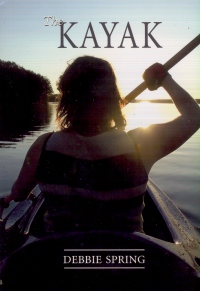| ________________
CM . . .
. Volume XVI Number 39. . . .June 11, 2010
excerpt:
For 17-year-old Teresa, life in a wheelchair is hardly a picnic. Ever since the hit-and-run accident that put her in there, she has felt helpless and confined. To make matters worse, her parents treat her like a child and don't seem to realize that she's nearly grown up. But on the lake it's different. She spends her whole year looking forward to her family's camping trips to Georgian Bay where she spends as much time as possible in the kayak. When she's out in her kayak, she can forget about the wheelchair and get away from her annoying little sister, the stresses of teenage life, and especially from her overbearing parents. One day, while she's out for an afternoon paddle, a sudden storm churns the water. Out in the distance, she notices a windsurfer in distress, and she realizes it's up to her to rescue him. When the windsurfer turns out to be a handsome boy about her age, the course of Teresa's summer suddenly changes. As their relationship grows, she learns to overcome her insecurities and begins to try new things. But relationships are complicated, and as the summer progresses, she will also discover that people's motives are not always as straightforward as they seem. As Debbie Spring did in her previous novel, Breathing Soccer, she once again looks at overcoming physical limits in this expanded version of her same-named short story. Teresa is an interesting character, and not simply because of her disability. In fact, she is a well-developed, realistic teenager who also happens to be in a wheelchair. At nearly 18, Teresa finds her parents to be a huge source of frustration, and she sees them as overprotective and suffocating. This feeling is only amplified by her wheelchair and the loss of much of her independence. As a result of her accident, Teresa has also forced herself into social isolation, and unlike her little sister, who immediately makes friends with a girl of similar age, she is suspicious of the other teens staying on the campground. Keenly aware of her limitations, she often feels on the outside when she is unable to participate in their activities. Boys are also a new ground for Teresa, and in the setting of a campground, the complicatedness of teen romantic triangles are made even more acute. Teresa's new relationships also help her to grow, and she learns a lot about herself and her capabilities.
Recommended. Rachel Siegel is the Selection Manager-Elementary with S&B Books Ltd. in Mississauga, ON.
To comment
on this title or this review, send mail to cm@umanitoba.ca.
Copyright © the Manitoba Library Association. Reproduction for personal
use is permitted only if this copyright notice is maintained. Any
other reproduction is prohibited without permission.
NEXT REVIEW |
TABLE OF CONTENTS FOR THIS ISSUE
- June 11, 2010.
AUTHORS |
TITLES |
MEDIA REVIEWS |
PROFILES |
BACK ISSUES |
SEARCH |
CMARCHIVE |
HOME |
